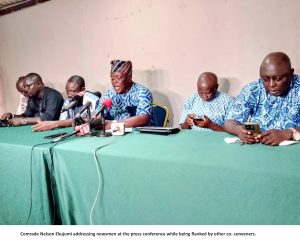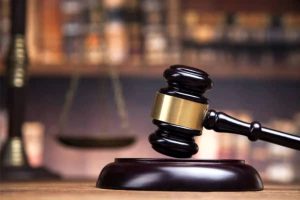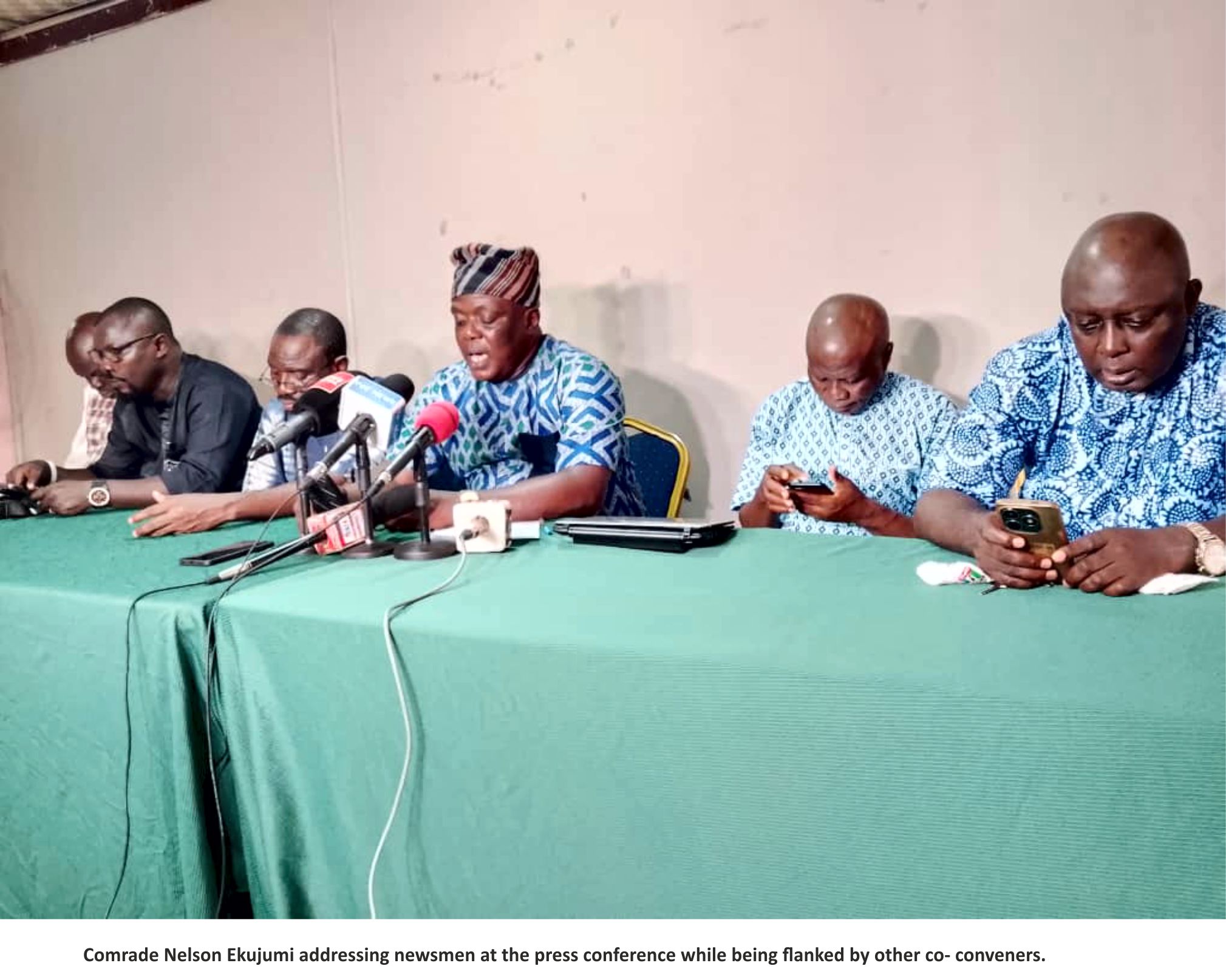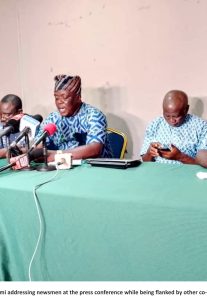RAYMOND TEDUNJAYE, Lagos.
 A coalition group under the aegis of Coalition for Good Governance (CGG), comprising of 80 Civil Society Organizations have reproached members of the House of Representatives on moves to upturn the ruling of the Supreme Court which declared that the House lacks the legislative power to enact the National Lottery Act.
A coalition group under the aegis of Coalition for Good Governance (CGG), comprising of 80 Civil Society Organizations have reproached members of the House of Representatives on moves to upturn the ruling of the Supreme Court which declared that the House lacks the legislative power to enact the National Lottery Act.
Addressing a world press conference on the matter on Sunday at Excellence Hotel, Ogba Lagos, the group therefore implored members of the Green Chamber to desist from what it described as ” Voyage of Legislative Rascality, Recklessness, Provocation and Lawlessness”.
It argued that the move by the House constitute a threat to national security, the constitution, democracy and abuse of legislative privileges by the National Assembly.
Hinting that the Senate is also to be co-opted into passing the Bill, the group urged the Senate not to allow itself to be railroaded and declined concurrence to the Central Gaming Bill, saying it does not deserve the Senate reciprocity resolution.
In a text read by the convener of the conference Comrade Nelson on behalf of the group, it recalled that the Supreme (Apex) Court on the 22nd of November 2024, nullified the National Lottery Act 2005 enacted by the National Assembly.
According to Ekujumi, ” The judgment followed the suit filed in 2008 by Lagos and other states of the Federation, challenging the Federal government’s powers to regulate lottery and gaming activities throughout Nigeria.
 “The states sought, amongst others, a declaration of the Court that the regulation of lottery activities does not fall within the remit of the National Assembly, under Part 1 of the Second Schedule of the 1999 Constitution as amended and is consequently not empowered to enact the National Lottery Act. The states as plaintiff(s) also sought a declaration that the National Assembly lacks the power to legally and constitutionally make any law to regulate and control the operation of lottery in Nigeria.
“The states sought, amongst others, a declaration of the Court that the regulation of lottery activities does not fall within the remit of the National Assembly, under Part 1 of the Second Schedule of the 1999 Constitution as amended and is consequently not empowered to enact the National Lottery Act. The states as plaintiff(s) also sought a declaration that the National Assembly lacks the power to legally and constitutionally make any law to regulate and control the operation of lottery in Nigeria.
“Ruling on the matter, the Supreme Court in a unanimous judgement consisting of seven justices held that the National Assembly lacked the powers to legislate on issues relating to lottery in respect of all states of the federation, except the Federal Capital Territory (FCT), Abuja. The court ruled that such powers only reside with the state Houses of Assembly, which possess exclusive jurisdiction over lottery.
“At page 60 of the judgment, the Supreme Court ruled thus:
“Lottery and gaming activities while generating revenue does not fall within the core category of economic activities envisaged by the Constitution under Section 16 (4)(b) and cannot be regulated by the provisions of an Act of the National Assembly.”
“At page 66, the Court further held:
“Consequently, the legislative authority of each State House of Assembly encompasses, among other matters, the power to regulate activities such as lotteries and other forms of gaming. I therefore hold that the National Assembly lacks the competence to enact the National Lottery Act 2005, as “lottery” is not included in either the Exclusive or Concurrent Legislative Lists in the Second Schedule of the Nigerian Constitution and as such, the subject matter lies entirely outside the legislative competence of the National Assembly. In the circumstances, the National Lottery Act, 2005 is therefore hereby declared unconstitutional, having been enacted ultra vires the legislative authority of the National Assembly.”
“Consequently, at pages 67 to 71, of the judgment, the Supreme Court held as follows:
“lottery or game of chance is not one of the 68 items in the Exclusive Legislative List in Part I to the Second Schedule to the Constitution of the federal republic of Nigeria 1999 (as amended) (“the 1999 Constitution”) in respect of which the National Assembly has the vires to make laws for the whole of Nigeria and not incidental or supplementary to any matter mentioned in the list.
“That having regard to the clear provisions of Section 4(2) and (3) of the Constitution of the Federal Republic of Nigeria, 1999 (as amended) (“the 1999 Constitution”) the National Assembly lacks the vires to legally and constitutionally make any law to regulate and control the operation of lottery in Nigeria.
“Having regard to the clear provisions of Section 4(4)(a), (b) and Part II of the Second Schedule of the Constitution of the Federal Republic of Nigeria, 1999 (as amended) (“the 1999 Constitution”), matters relating to lottery do not fall within items which the National Assembly and the state house of assembly are concurrently empowered to make laws with regard thereto.
“Having regard to the clear provisions of Section 4(7)(a) and (c) of the Constitution of the Federal Republic of Nigeria, 1999 (as amended) (“the 1999 Constitution”), the Lagos State Government (represented by the 1st Plaintiff) and the 2nd – 22nd Plaintiffs’ State, have the power, to the exclusion of the 1st and 2nd Defendants, to make laws to regulate and control the operation of lottery within their States.
“Having regard to the clear provisions of Section 4(4)(b),(7)(a) and Section 299(a) of the Constitution of the Federal Republic of Nigeria, 1999 (as amended) (“the 1999 Constitution”), the power of the National Assembly to make laws to regulate and control the operations of lottery is limited by the 1999 Constitution to only the Federal Capital Territory.
“Sections 17, 18, 19, 20 and 21 of the National Lottery Act N145, Laws of the Federation of Nigeria, made by the National Assembly are inconsistent with the provisions of the 1999 Constitution.
“The National Lottery Act, N145, Laws of the Federation of Nigeria is inconsistent with the provisions of the 1999 Constitution.
“AN ORDER is made nullifying the entirety of the National Lottery Act CAP N145, Laws of the federation of Nigeria.
“AN ORDER of perpetual injunction is made restraining the 1st Defendant either by himself, agents, privies, agencies of the Federal Government of Nigeria or Federation of Nigeria, or through anybody acting on their behalf from implementing the provisions of Sections 17, 18, 19, 20 and 21 of the National Lottery Act CAP N145, Laws of the Federation of Nigeria, within the territory of the States of the Plaintiffs.
“AN ORDER of perpetual injunction is made restraining the 1st Defendant either by Himself, agents, privies, agencies of the Federal Government of Nigeria or Federation of Nigeria, or through anybody acting on their behalf from taking any step or actions aimed at enforcing or continuing to enforce any/or all of the National Lottery Act CAP N145, Laws of the Federation of Nigeria, within the territory of the States of the Plaintiffs.”
The group averred that ,”The Supreme Court, being the apex court of the country possesses by virtue of Sections 6(6)(b), 235 and 287, of the Constitution the exclusive final authority to interpret the constitution and the laws in Nigeria as it affects the rights and obligations of persons and authorities.
According to it, “Therefore once the Supreme Court has made a decision on a subject, particularly under the Constitution of Nigeria it becomes final and binding on all persons and authorities in the Federal Republic of Nigeria — including the Executive and the Legislature.
“The legislature cannot directly overturn a specific Supreme court judgment, In this case the underlying law is the Constitution of Federal Republic of Nigeria and having not amended the Constitution of Nigeria to include in the exclusive legislative list item such as lottery, gambling and gaming, the Central Gaming Bill as currently constituted directly conflicts and contradicts the provisions of the extant Constitution of Nigeria and a subsisting and binding judgment of the Supreme Court of Nigeria on the subject. Consequently, as at today the National Assembly can only legislate on lottery, game and gambling for the Federal Capital Territory, Abuja.
“Therefore, if the Supreme Court which is the highest court in the land adjudicate on an issue of dispute between the federal government and states governments, its judgement automatically becomes a law, thus, we are at a loss to rationalize the reason for the national assembly made up of the Senate and the house of representative attempting to illegally and unconstitutionally rewrite the law, other than to undermine democracy, national security and the constitution by this voyage of lawlessness which stands condemned in all ramifications.
“At this moment, we have been made aware that this voyage of rascality and lawlessness has moved from the house of representatives to the Senate, which is set to subject the illegal and unconstitutional passage of the bill from the lower chamber to it’s own legislative machinery for consideration which amounts to an assault on legislative integrity, honour, national security, democracy and a promotion of lawlessness.”
The group in the text signed by Nelson Ekujumi, Convener, Razaq Olokoba
Co-convener, Razaq Oladosu
Co-convener, Gbenga Soloki
Co-convener, Ajayi Popoola
Co-convener, Peter Oparah
Co-convener, Shola Justice Omolola
Co-convener and Gbenga Omage
Co-convener, demanded , “An immediate stop to this illegal and unconstitutional voyage of legislative rascality and lawlessness by the Senate.
“An Unreserved apology to the people of Nigeria by the house of representatives for the assault on legislative integrity, honour, the constitution, our democracy, and national security by the irresponsible and unconstitutional passage of the vexatious and illegal bill.
Conclusively, group stated that, “the Senate now has a golden opportunity afforded it by our press conference of laying bare the matter, to retrace it’s step of being railroaded on a voyage of legislative rascality and lawlessness by declining concurrence to the Central Gaming Bill as it does not deserve the Senate reciprocity resolution”.


